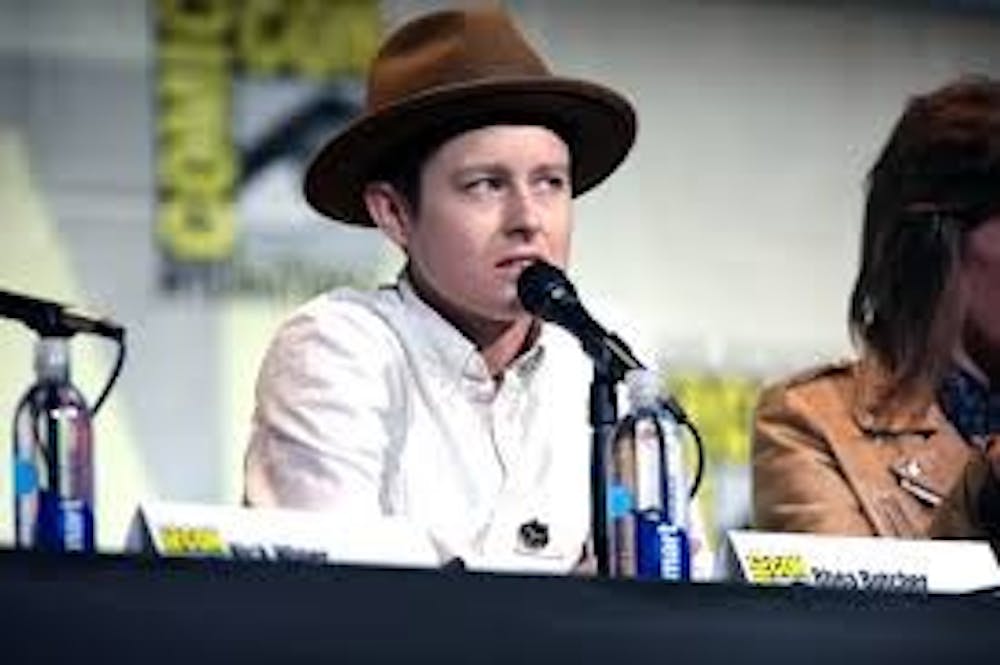The Creative Alliance hosted stand-up comic Rhea Butcher as part of their Freeze Peach Series on Friday, March 30. The Freeze Peach Series is designed to feature comics whose content helps fight silence and censorship of underrepresented voices, both on- and off-stage. Butcher’s comedy centers around their experience as a queer non-binary person growing up in the Midwest, so they were an obvious choice to headline an LGBTQ-focused show.
I started following Rhea Butcher and their wife, Cameron Esposito, after they were featured in a Buzzfeed video entitled “Questions You Want To Ask A Lesbian About Her Girlfriend” in 2014. As a questioning freshman, I was starving for resources to help me figure out my identity.
I didn’t have any queer lady role models in the mainstream media, so finding a queer couple that was comfortable in their identities and willing to answer questions about it was so, so valuable to me.
Then I went through a stand-up comedy phase, and I was increasingly frustrated by how straight, cisgender comedians often made LGBTQ people the butt of their jokes. It was and remains hard to get through a Netflix special without finding something cringe-worthy. Is there really no way to be funny without marginalizing an entire community?
As it turns out, there is, in fact, a way to be funny and LGBTQ-friendly. Together, Butcher and Esposito wrote, produced and starred in a comedy series entitled Take My Wife, which ran for two seasons.
They have a podcast called Put Your Hands Together where they share the stage with other comics. And Butcher’s debut comic album, Butcher, debuted at number one on iTunes.
So as you can imagine, I was ecstatic when the Arts editors asked me to cover Butcher’s show. I headed to the Creative Alliance, an arts space in Highlandtown that hosts a variety of performances, art shows and educational workshops.
Their performance space is a small black box theater with a bar tucked into the corner. String lights hung from the ceiling, and the stage was bare save for a single microphone and a wooden stool.
The crowd was unique, the type of group I’ve only ever seen at one other place before: the Broadway show Fun Home. I knew that Butcher’s main audience was queer women and non-binary folk, but I was still surprised by how few cis men were in the room and how many women were holding hands with other women. A Rhea Butcher show demands we throw heteronormativity out the window, and this audience did just that.
Several Baltimore-based comics opened for Butcher, and each of them found humor in their identities. Raine Alexander, a trans woman, discussed how her sex-affirming operation last year cured her gender dysphoria, saying she got her “foyer remodeled.”
Jessica Murphy Garrett discussed her experiences as a black woman in her 30s and commented on how tampon commercials promote unrealistic expectations of periods.
“I thought I’d be playing a lot more tennis,” she said. “Commercials make you think I’m supposed to be having an adorable period.”
When Butcher finally took to the stage, we in the audience were all ready. We’d found Butcher through their wife, or we found Butcher through their podcast, or we found Butcher through their comedy album, or we found Butcher any number of other ways. The important thing is that we found them, and we connected with them, through shared experiences and comedy.
In person, Butcher was the same awkward and endearing presence we fell in love with on the internet. It was the first night of their tour, and Butcher noted how exciting it is that each stand up show has an element of improvisation imbued in it.
Butcher’s comedy comes from a variety of sources, including baseball, Diva cups and the way cisgendered, heterosexual men talk-yell at one another in airports.
At one point, Butcher broke from their purely humorous tone to talk about the Black Lives Matter movement. They acknowledged that most of their audience is white and that it is the responsibility of white people to educate one another. The way they managed to discuss issues of racial inequality within a comedic context without being offensive was impressive.
“Full equality will come when nude at Victoria’s Secret means a thousand different colors,” they said. “Nude is a concept. That’s why I went to art school, so I could tell a room full of people that nude is a concept.”
None of Butcher’s comedy relied on their being queer or non-binary. Butcher uses they/them pronouns, and they talked about the experience of shopping for clothes in the men’s section, but their show focused more on the comedy than on any facet of having an underrepresented identity.
Butcher had never put out any sort of press release in regards to their gender until Friday. They used Twitter as a platform to share their pronouns and to explain why they had held off on making such an announcement before.
“I didn’t want to [have a press release] because I want the attention to be on comedy, my work, etc.,” the tweet read.
In a later tweet, Butcher expressed how important it is to allow yourself to grow and change.
“Nothing is written in stone. That is the beauty of life. You can discover and rediscover and create yourself as much as you like,” the tweet read.
As a cisgender woman, I can never understand what it’s like to fit somewhere outside of the binary, but I understand what it’s like to struggle with certain facets of my identity. Butcher helped me grow more comfortable with myself simply by being open about their relationship. And maybe their comedy will help people struggling with their gender identities, too.
And I have to say that whether it’s at Fun Home, a screening of Love, Simon, or a stand-up comedy show, sitting in a majority-queer audience is always a validating experience.





